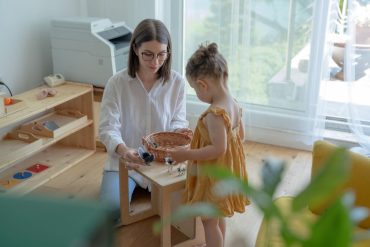In my example, I might remind myself of how challenging motherhood can be, that many of my friends crave time to themselves, and that sometimes it is not full-on bliss to be in the company of children, particularly if we’re feeling depleted.
“When things go wrong in our external lives through no fault of our own, we often assume that other people are having an easier time of it, that our situation is abnormal or unfair. We feel cut off and separate from other people who are presumably leading “normal” happy lives.”
Kristen Neff
Cultivate mindfulness
Mindfulness is about being present with whatever we are experiencing without trying to change or resist anything. You become the observer of your thoughts and emotions; you are not your actual thoughts and emotions. Dr. Neff explains it this way:
Imagine you are in a cinema – you’re engrossed in what is happening in the movie. You jump when the bad guy attacks, you cry when the loved character dies. But then, the person next to you sneezes and suddenly – you are back in your seat with your popcorn – reminded ‘oh I am watching a movie.’
I find that saying something like, “I am noticing that I am putting huge and unrealistic expectations on myself” allows a certain detachment from the heat of the thoughts.
This step is about bringing equilibrium – getting the balance of not suppressing and also not overly identifying with the thought or emotion.
One way to cultivate mindfulness is through meditation. It can help to facilitate a slowing down and a presence that is difficult to achieve, particularly when we’re busy.
There are some great free guided meditations to try here (particularly the Befriending Meditation) and here.
Although meditation is beneficial as a daily practice, it can also be a great medication for an inner critic headache.
Take values-aligned action
When we’re clear on what is most important to us (our values), it allows a re-focus when things are going pear-shaped. When we connect with our goals and values, it will enable us to act and move forward in a way that is authentic, helpful and proactive. From this place, we can ask ourselves, “What is the small step I can take towards my values and goals?”.
Keep at it
Building self-compassion can feel awkward and difficult as we experiment with it because it is in our nature to have a negativity bias.
Listening to our inner critic can sometimes be easier than cultivating the discipline of being compassionate to ourselves.
It might seem harder to slow down and follow these steps, but the reward is great. And it takes persistent practice. I don’t think there is an end-point where there is no longer a critic (or at least my endless search has not led me to this nirvana). We have to consciously choose to not allow our inner critic to take over – it won’t happen automatically.
Imagine if our inner critic whispered instead of shouted. What effect would that have on our confidence, happiness and our ability to live a purpose-driven life?
More resources:
There are some helpful exercises on Dr Neff’s website.
Belinda Haan is a writer, advocate, and facilitator focused on re-writing the motherhood experience. She uniquely blends the best of psychology and heart to support women in their transition into motherhood. She is the founder of The Motherhood Gathering, which provides a loving container for women as they navigate the joy and full catastrophe of early motherhood. You can follow Belinda on Facebook, Instagram and LinkedIn.










